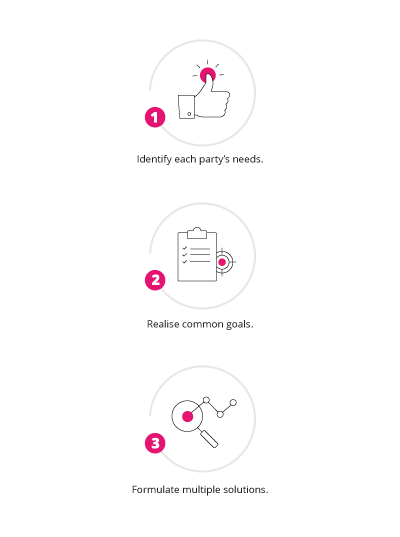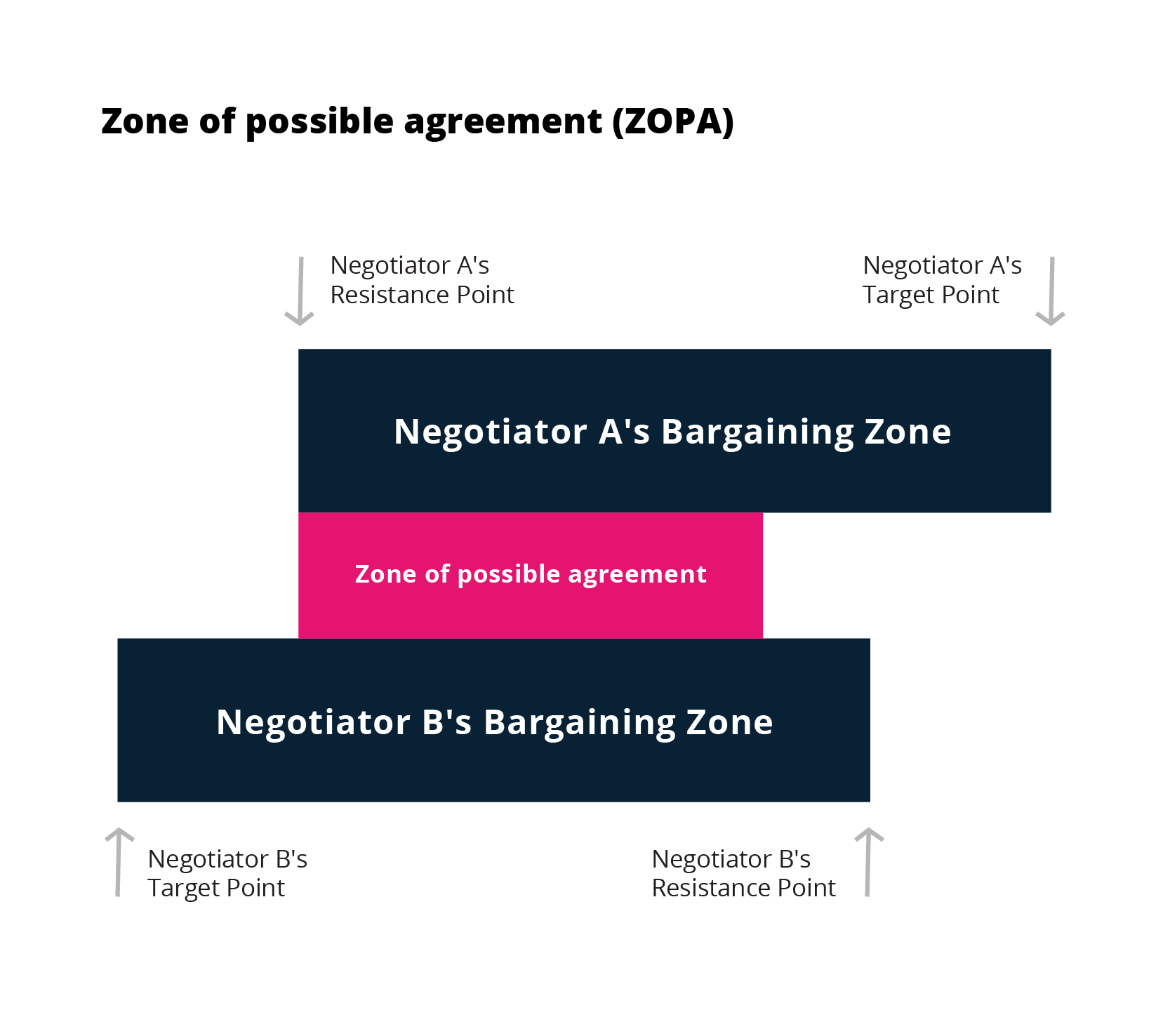5 Strategies for Closing a Deal in Negotiations
Negotiation today is no longer solely about closing a deal. Instead, it’s about accomplishing something greater: a beneficial outcome for both parties. As a fundamental element within society – and particularly business – the art of negotiation requires a unique skill set as extensive preparation, strategy, and insight goes into securing a successful outcome. Understanding the goals, fostering ‘win-win’ value, and navigating biases are all part of this nuanced interaction. Whether you’re negotiating a new salary, finalising a business deal, or navigating team dynamics, negotiation is a key component to achieving goals and building relationships. Its integral role within business is why negotiation has been listed as one of the top skills within the workplace.1 As organisations and industries become more complex, it will be essential to navigating the future.
Workplace negotiation strategies
Integrative negotiation is one of the best techniques for mitigating challenges and reaching a solution in the workplace. Often referred to as a ‘win-win’ strategy, it dismisses the idea that negotiation centres around conflict, competition, and confrontation. Instead, integrative negotiation focuses on two or more issues and follows an approach that accounts for the goals of each party involved.2 Working with creative and collaborative problem-solving, this technique places relationships front and centre. The strategy requires you to:3

Exploring this negotiation strategy is not only valuable for each stakeholder but also fosters a collaborative effort within challenging times. Insights are revealed, and better understanding is formed, and often the ideas brainstormed can be used outside of the negotiation scenario.
5 key steps to closing a deal
Before any negotiation begins, it’s beneficial to identify the BATNA: the Best Alternative To a Negotiated Agreement.4 If your negotiation fails, what would be your best walk-away option? Realising your interests, as well as the other party’s, is instrumental in closing a deal. Whatever situation or strategy, maintaining clarity will ensure the process is beneficial, timely, and productive. The consequences of not collaboratively exploring all interests could result in prolonged discussions and an unwillingness to cooperate. In such a competitive landscape, negotiators also need to anticipate and manage potential competitor offers. An external proposition that’s more valuable can make your counterpart reluctant to close with you.5
When negotiating, the following five steps can help you overcome roadblocks and effectively close a deal:
1. Create a deadline
Setting deadlines can provide a healthy incentive to close a deal and avoid discussions that drag over lengthy periods.6 While negotiators often worry that deadlines will force them into compromising, deadlines affect everyone equally.7 The other party will feel the same pressure. Making concessions often spark cooperation, which can work in your favour when closing. Putting a time constraint on the negotiation also incites creative thinking and problem-solving from both sides.
2. Set your limits
When you go into a negotiation, you should always have a goal, or a target point (TP), as well as a limit, or a resistance point (RP). Your TP is your ideal outcome, while your RP is the lowest offer or outcome you’re willing to accept.8 The range between these two points is your bargaining zone or the area in which an agreement can be reached. Having a clear idea of what you do and don’t want out of the negotiation will allow you to be direct in your communication and know when there’s potential for a deal, and when it’s unlikely. If you recognise early on that your bargaining zones don’t overlap and that there’s no zone of possible agreement (ZOPA), you’ll be able to close the deal by walking away.9 However, if they do overlap and there is a ZOPA, you’ll be able to pick this up early and move the discussion forward more quickly and effectively.

3. Find your common ground
Finding common ground early in a negotiation allows you to build trust and rapport with your counterpart and create an environment that promotes cooperation and collaboration. Many negotiators underestimate the effect their attitude can have on how they close the deal. Many people tend to respond to other people’s actions with similar actions, and if you cooperate and treat the other party with respect, it’s likely they’ll do the same.10 Taking the time to get to know each other and building a connection establishes a solid foundation early on, and will assist in closing the deal amicably and maintaining a good relationship going forward.
4. Brainstorm creative solutions
When you’re working towards a solution, try to brainstorm and think creatively together. This allows you to separate the problem from the people and come up with a solution that satisfies both parties. Using objective criteria such as industry standards or statistics can help you overcome areas of dispute without becoming personal.11 By making the solution feel shared and fair, you remove ownership from the equation, and neither party feels they lost anything when the deal comes to a close.
5. Test and summarise your communication
A lack of clarity and communication among the parties negotiating is often a barrier to closing a deal. During the discussions, try to verbally summarise progress and ask questions that reiterate what the other party has said. By continually evaluating whether you’re understanding one another and ensuring there has been no miscommunication, you mitigate any risk of confusion when you want to finalise the deal.12
Whatever the situation, a satisfactory outcome is always possible, provided you possess the necessary negotiation skills. This is why GetSmarter has partnered with a range of leading academic institutions to give you the opportunity to gain key negotiation knowledge on an online short course. In addition to exploring useful strategies, you’ll be exposed to practical frameworks and expert insights to help ensure that your next negotiation is not only successful, but collaborative, too.
- 1 Peart, N. (Sep, 2019). ‘The 12 most important skills you need to succeed at work’. Retrieved from Forbes.
- 2 (Nov, 2019). ‘Integrative negotiation’. Retrieved from Negotiation experts.
- 3 (Feb, 2020). ‘Integrative negotiation: Definition, tips and examples”. Retrieved from Indeed.
- 4 Chem, J. (May, 2020). ‘Best alternative to a negotiated agreement (BATNA)’. Retrieved from Investopedia.
- 5 Shonk, K. (May, 2020). ‘7 tips for closing the deal in negotiations’. Retrieved from Harvard Law School Program on Negotiation Daily Blog.
- 6 Pon Staff. (Mar, 2020). ‘5 dealmaking tips for closing the deal’. Retrieved from Harvard Law School Program on Negotiation Daily Blog.
- 7 Shonk, K. (May, 2020). ‘7 tips for closing the deal in negotiations’. Retrieved from Harvard Law School Program on Negotiation Daily Blog.
- 8 Nd. ‘Target point vs. resistant point in negotiations’. Retrieved from Study. Accessed 19 June 2020.
- 9 Halton, C. (May, 2020). ‘Zone of possible agreement’. Retrieved from Investopedia.
- 10 Pon Staff. (Mar, 2020). ‘Negotiation skills: learn how to build trust at the negotiation table’. Retrieved from Harvard Law School Program on Negotiation Daily Blog.
- 11 Pascasu, A. (Jan, 2019). ‘Negotiation framework: mutual gain and objective criteria’. Retrieved from Apepm.
- 12 Dooley, K. (Nd). ‘13 tips from skilled negotiators.’ Retrieved from Resourceful Selling. Accessed June 11, 2019.